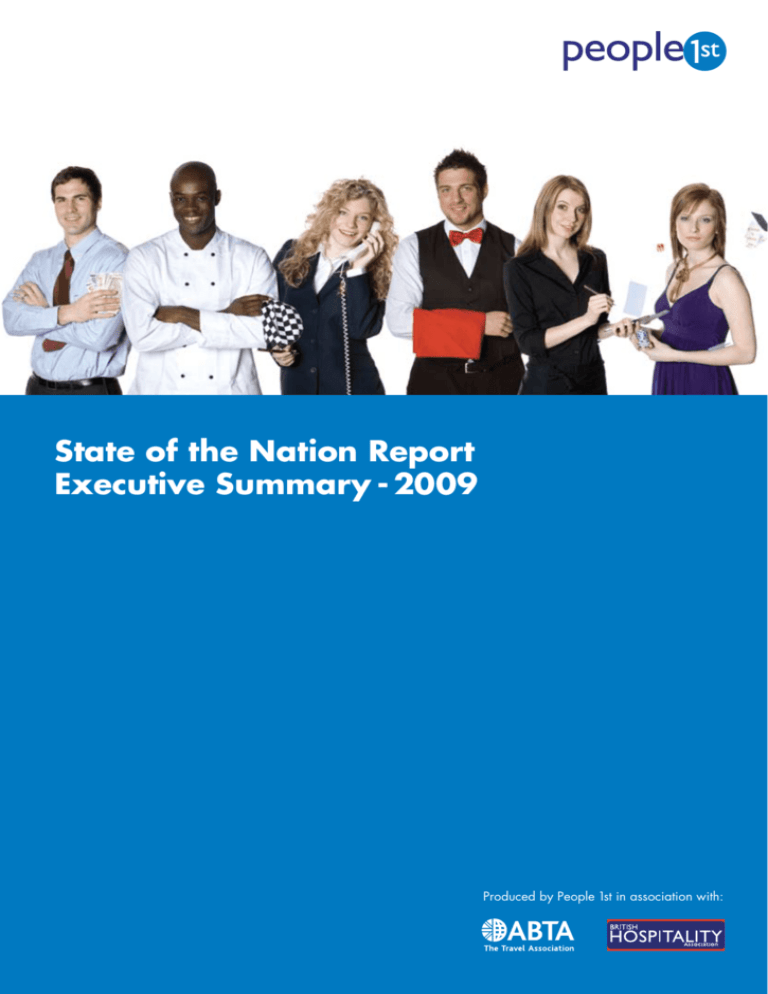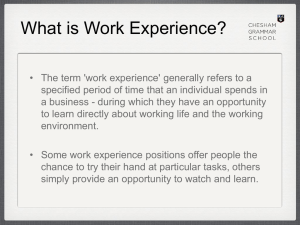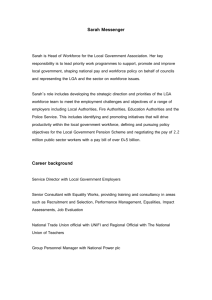State of the Nation Report Executive Summary - 2009
advertisement

State of the Nation Report Executive Summary - 2009 Produced by People 1st in association with: Executive Summary State Of The Nation • T he hospitality, leisure, travel and tourism sector continues to play an important role in the UK economy. It has enjoyed a sustained period of growth over the last 30 years and now accounts for nearly five percent of the UK’s total economic output. • T he sector employs in the region of two million people accounting for 1 in 14 UK jobs. What’s Changed? The workforce • F ortunes across the sector have varied over the last five years. The gambling and restaurant industries have enjoyed a period of growth with their workforces increasing by 16 and nine percent respectively. The pub, bar and nightclub, hospitality services (mainly in-house public sector catering) and travel and tourist services industries have seen their workforces decline by nine percent, six percent and three percent respectively. • O ver the last 12 months, the pub, bar and nightclub industry has suffered badly. It is reported that Britain’s pubs are now closing almost ten times faster (39 a week) than in 2006 (four a week) and nearly twenty times faster than in 2005 (two a week). Consequentially, 64,100 fewer people were working in the industry in December 2008 than in December 2007, a 19 percent decline. • A t an occupational level, there has been a 23 percent decline in the number of bar staff in the UK over the last year and a 35 percent decline in the number of publicans and managers of licensed premises over the last five years. • A cross the hospitality sector, other occupational groups are growing. There has been a 27 percent increase in the number of people working as conference and exhibition managers over the last five years and a 13 percent increase in the number of people working as hotel and accommodation managers over the same period. • W ithin the travel industry, there has been a 30 percent decline in the number of travel consultants over the last three years. However, the latest figures suggest the industry has stabilised after a period of decline. • In terms of the characteristics of the workforce, the sector continues to be heavily reliant on young people. 16 percent of the workforce are aged between 16 and 19 whilst only five percent are over the age of 60. • W hilst 59 percent of the workforce are female, the number of women working in senior management positions (in the hospitality industry in particular) is low. In fact, the proportion of managers in the hospitality industry who are female fell from 49 percent in 2004/05 to 46 percent in 2007/08. According to the One and All Foundation, less than six percent of hospitality industry company directors are women. • A pproximately 55 percent of women working in the sector do so on a part-time basis compared to 31 percent of men. Part-time work is more vulnerable in a recession. • A ccording to the One and All Foundation, only two percent of hospitality board directors are from a black and minority ethnic (BAME) background and only six percent of middle management positions are occupied by BAME employees. Recruitment • In February 2008 there were 47,875 registered unemployed people looking for work in the hospitality, leisure, travel and tourism sector. This rose substantially to 75,345 in February 2009. It is estimated that this equates to 1.8 people looking for a job in the sector per vacancy (compared to 0.5 people per job in February 2008). • 2 6 percent of hospitality, leisure, travel and tourism businesses froze recruitment at some point during the 12 months to March 2009 and 24 percent have cancelled plans to expand their workforce. • 2 3 percent of sector businesses have reduced their use of temporary employees. This figure is highest in the food and service management (30 percent) and pubs, bars and nightclubs (29 percent) industries. • L abour turnover across the sector is the highest of all sectors of the economy and despite the economic downturn rose from 30 percent in 2005 to 31 percent in 2008. It is estimated that sector employers spent £414 million on recruiting and developing new staff in 2008/09. • A pproximately 19 percent of all sector vacancies are proving hard-to-fill due to a shortage of skilled applicants. • C hefs remain the occupation that employers find most difficult to recruit for, mainly due to a lack of applicants with the required skills. Skills and Training • T he sector appears to be making some inroads in improving the skills of the current workforce. Slightly fewer businesses are reporting that their staff lack skills than a year ago. However, nine percent of the workforce – some 179,000 people – still do not possess the skills their employer requires. • O verall qualification levels have risen over the last five years. The proportion of the workforce with at least a Level 2 qualification rose from 60 percent in 2003/04 to 64 percent in 2007/08. • M ore employers in the sector are training their staff than previously (66 percent in 2007 compared to 61 percent in 2005). However, much of this training is informal and less than a third of employers have a formal training budget. • E mployer awareness of how to access government funded training provision is improving. In 2006, only 20 percent of sector employers said that they knew who to contact regarding accessing government funding to train staff. In 2009 this had risen to 28 percent. • M anagement skills appear to be improving. The proportion of employers reporting that their managers lack the required skills fell from 30 percent to 26 percent between 2005 and 2007. • T he percentage of businesses with skill gaps in their workforce reporting that chef skills are lacking rose from 44 percent in 2005 to 50 percent in 2007. This could be a result of more sector businesses employing chefs than previously. Many pubs for example have introduced food in a response to the smoking ban and decline in drink sales. • C ustomer service skills are the main skills lacking within the current workforce but there are signs of improvement. 57 percent of businesses with skills gaps in their workforce say their staff lack customer handling skills, a decrease from 62 percent in 2005. • Improvements in service standards could in part be due to the high number of Accession State workers entering the sector (particularly the hospitality industry) who employers tend to believe have good customer service skills. As fewer migrant workers are now entering the sector (25 percent of employers who employ Accession State workers are employing fewer than 12 months ago) and employers become more reliant on the indigenous population, there is a danger that customer service levels could fall. • E mployers are re-appraising the value of apprenticeships. More than 500 sector employers employ apprentices as a cost-effective way to invest in the future workforce. It takes just over a year to recoup the cost of a hospitality apprenticeship and one travel employer has calculated that apprentices stay with the company two years longer and contribute roughly 17 percent more sales than other employees in similar roles. • In line with People 1st’s Apprenticeship Strategy, completion rates continue to increase. Having a rigorous recruitment and selection process has emerged from the research as a key factor in achieving high completion rates. Providing appropriate information, advice and guidance during recruitment and ensuring the learner is on the most suitable programme is vital. • A ttempts to tackle skill needs need to take into account the polarisation of the sector. 77 percent of sector businesses are small and medium-sized enterprises (SMEs) and only one percent employ more than 250 people. However, these large businesses provide employment for 43 percent of the total workforce about 854,000 people. • L arger businesses are much more likely to be aware of sector related qualifications and to take advantage of public funding to train their staff. Smaller businesses remain largely unaware of what is available. • O nly 23 percent of micro businesses know who to contact about accessing government funding for training compared to 30 percent of small businesses and 48 percent of medium and large businesses. What Is The Impact Of The Recession? • T he overall size of the workforce fell by about one percent during 2008. • A s a result of the recession there are fewer job vacancies across the sector. Just over a quarter of businesses have frozen recruitment and there are now nearly twice as many people looking for work in the sector as the number of vacancies. • T he recession has already meant that for the first time in over a decade many employers are in a position where they have a real choice in the selection of candidates. Consequently, 53 percent of sector businesses believe that qualifications are becoming more important in helping them choose between job applicants. • T he recession is forcing more employers to think about cutting costs. It is therefore more important than ever that employers have credible retention strategies to retain skilled staff and reduce unnecessary recruitment costs. • T raining becomes more not less important in a recession, but of concern is that 51 percent of sector businesses are planning to cut training as a result of the recession. However, 25 percent are planning to increase training. • H ow employers are looking afresh at training during the recession varies. 37 percent of businesses say that the recession will encourage them to seek support (or more support) through Train to Gain (in England) or the apprenticeship programme. This will help upskill and professionalise the workforce as well as help support training budgets in this critical time. • 6 2 percent of businesses who pay for external training say that the recession will encourage them to move more training in-house. What Does The Future Hold? • W hilst, along with the rest of the economy, trading will be tough in the short term, in the long term the sector is still predicted to grow and remain an important contributor to the UK economy. • T otal employment in the sector is forecast to grow by nearly 10 percent (208,000 additional jobs) by 2017. • W hen replacement demand is taken into account, projections indicate that a total of 1,063,000 additional people will be required to work in the sector between 2007 and 2017. • It is forecast that demand for graduates will grow as there will be 69,000 more managerial jobs in the sector in 2017 than in 2007. • C urrently a relatively high proportion of sector graduates enter jobs in other industries, 13 percent entering jobs in the retail sector. • T he sector continues to be over-reliant on a shrinking pool of younger workers. 48 percent of the sector’s workforce are under the age of 30 compared to 18 percent of the workforce across the whole economy. In recent years, many hospitality employers have also become reliant on migrants from Eastern Europe, some of whom may be encouraged to return home in the current economic climate. • M any young people and Eastern European migrants working in the sector are ‘transient workers’ which contributes to high levels of labour turnover. When the economy recovers and recruitment levels increase, employers that target their recruitment towards those who are potentially likely to stay with the business for a longer period (such as older workers and women returning to work) could improve their staff retention rates thereby reducing recruitment and training costs. Preparing for Recovery Brian Wisdom Chief Executive People 1st Hospitality, leisure, travel and tourism sector businesses are operating in challenging times. Many are choosing to freeze recruitment in a bid to reduce costs and ride out the downturn. This is increasing the currency of sector-related qualifications as competition for vacancies intensifies. It is therefore more important than ever that those entering the labour market are equipped with the skills industry needs. The role of schools and colleges is critical, as is the value and relevance of the qualifications students are studying. An important step forward is the creation of new Diplomas in Hospitality and Travel and Tourism in England. September 2009 will see the first students starting the Diploma in Hospitality, with the Diploma in Travel and Tourism following in 2010. What makes the Diplomas unique is the fact they have been designed by sector employers in partnership with educators. They provide an important opportunity to equip students aged between 14-19 with a broad range of skills required by the sector whilst at the same time demonstrating the exciting range of career opportunities across the sector. The Diplomas will be made available in Wales within the Welsh Baccalaureate. The National Skills Strategy for the hospitality, leisure, travel and tourism sector was launched in 2007. It outlined three main skill priorities: management and leadership, chef skills and customer service. Two years on these priorities remain unchanged and this latest research underlines their significance. Indeed, the recession intensifies their importance, with management and customer service skills in particular likely to become even more important as competition intensifies for a declining customer base. Progress continues apace in these three skill areas. In terms of customer service, People 1st is overseeing the development of two new short customer service qualifications for the hospitality, leisure, travel and tourism sector. These will be available from June 2009. The new qualifications are part of a wider strategy to tackle head on the significant numbers of people without adequate customer service skills. This will be crucial in ensuring that events such as the London 2012 Olympic and Paralympic Games and the Glasgow 2014 Commonwealth games are a success. In terms of management and leadership, financial management skills are vital in the current climate as businesses look to reduce costs. Improving people management skills and staff retention will be one way to reduce costs as labour turnover across the sector remains high and a costly problem. The economic downturn could provide opportunities for businesses within the sector to attract talented managers from other industries, particularly retail which requires a similar skill set and in which many redundancies have recently been made. It also poses a challenge to higher education institutions to ensure that courses are relevant and that more students can see the career opportunities available in the sector. The evidence suggests that the demand for skilled chefs remains high. In 2006, in the context of mounting criticism of the National Vocational Qualification (NVQ) delivered in colleges, People 1st oversaw the development of the Diploma in Professional Cookery to equip full-time students with the skills and knowledge employers were demanding. This qualification is being rolled out across colleges in England, Wales and Northern Ireland and is likely to replace the full-time delivery of the equivalent NVQ by 2010. Employer feedback has been very positive, largely because the content of the qualification is the same regardless of where it is being delivered, the robust practical end tests and the grading system of fail, pass, credit and distinction. In many cases an increasing number of employers are going into the colleges to help assess the practical end tests and are recruiting successful students. Apprenticeships will play an increasingly important role in developing chef skills in the workplace. The Apprenticeship provides a viable alternative to full-time college courses for those wishing to go straight into industry. We are working closely with employers and learning providers to put in place robust Apprenticeships that develop the breadth of skills and knowledge employers require. This can be seen in the new Hospitality Supervision and Leadership Apprenticeship, which will be available from September 2009. The recession has encouraged a third of employers to consider offering their staff nationally-recognised qualifications and accessing public funding. This is a positive reaction to a challenging time for many businesses as evidence suggests that formal qualifications can aid retention and increase the skills of staff. People 1st’s work to simplify the education and training system has already resulted in the removal of half of the available sector-related qualifications. This will make it easier for employers to understand the qualifications on offer. This report presents the findings of research conducted by the People 1st research team between January and March 2009. The research methodology included a representative survey of 1,300 sector businesses, analysis of a range of secondary datasets, interviews with industry experts and a review of relevant literature. The full ‘State of The Nation’ Report is available to order from People 1st - www.people1st.co.uk In addition, following an agreement with government in 2008, People 1st brokered a Compact which will provide £112m worth of public funding to support training in the sector in England. This includes funding 4,000 places on the new customer service qualifications. Similarly in Northern Ireland, the Future Skills Action Plan will enable funding to be directed towards qualifications valued by employers. The reaction of many employers is to cut back training budgets during a recession. However, there is a growing wealth of evidence which suggests that cutting training is a false economy and that those who continue to develop the skills of their staff will be in a better position to take advantage of the anticipated upturn. For those businesses who do decide to move more training in-house it will be critical that they are supported and that internal staff are skilled to be able to deliver that training to a high standard. The recession provides new challenges and opportunities for the sector. People 1st is working with government to help re-skill jobseekers to work in the sector, as well as to provide ongoing support to smaller businesses during this difficult period. Looking beyond the recession, the sector is projected to grow and it is important that we continue to move the National Skills Strategy forward to ensure that, in the long-term, the demands that this growth will bring can be met. Second Floor Armstrong House 38 Market Square Uxbridge UB8 1LH United Kingdom Tel: 01895 817000 Fax: 01895 817035 info@people1st.co.uk www.people1st.co.uk Sponsored by






